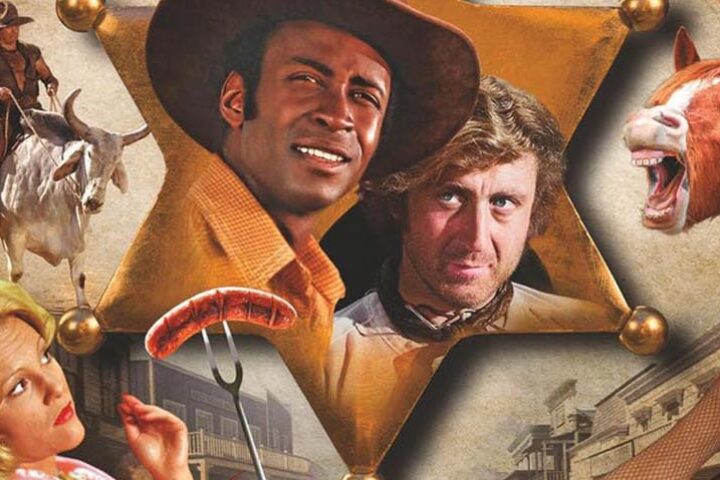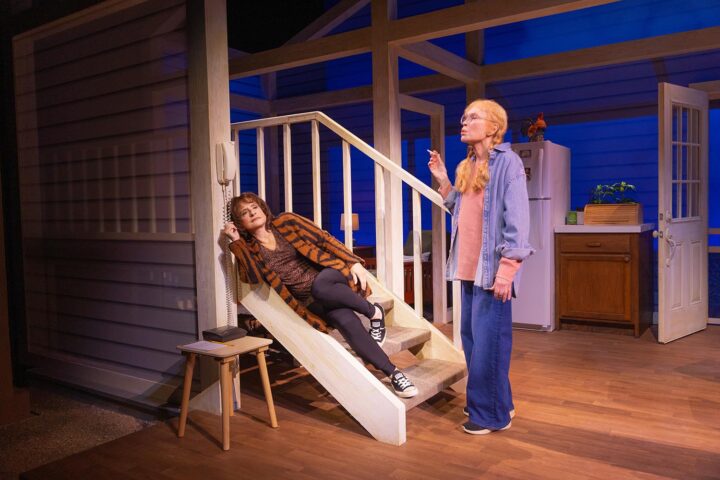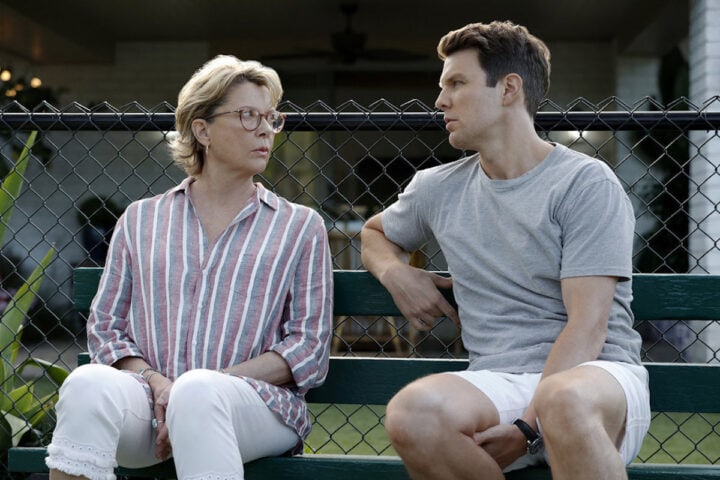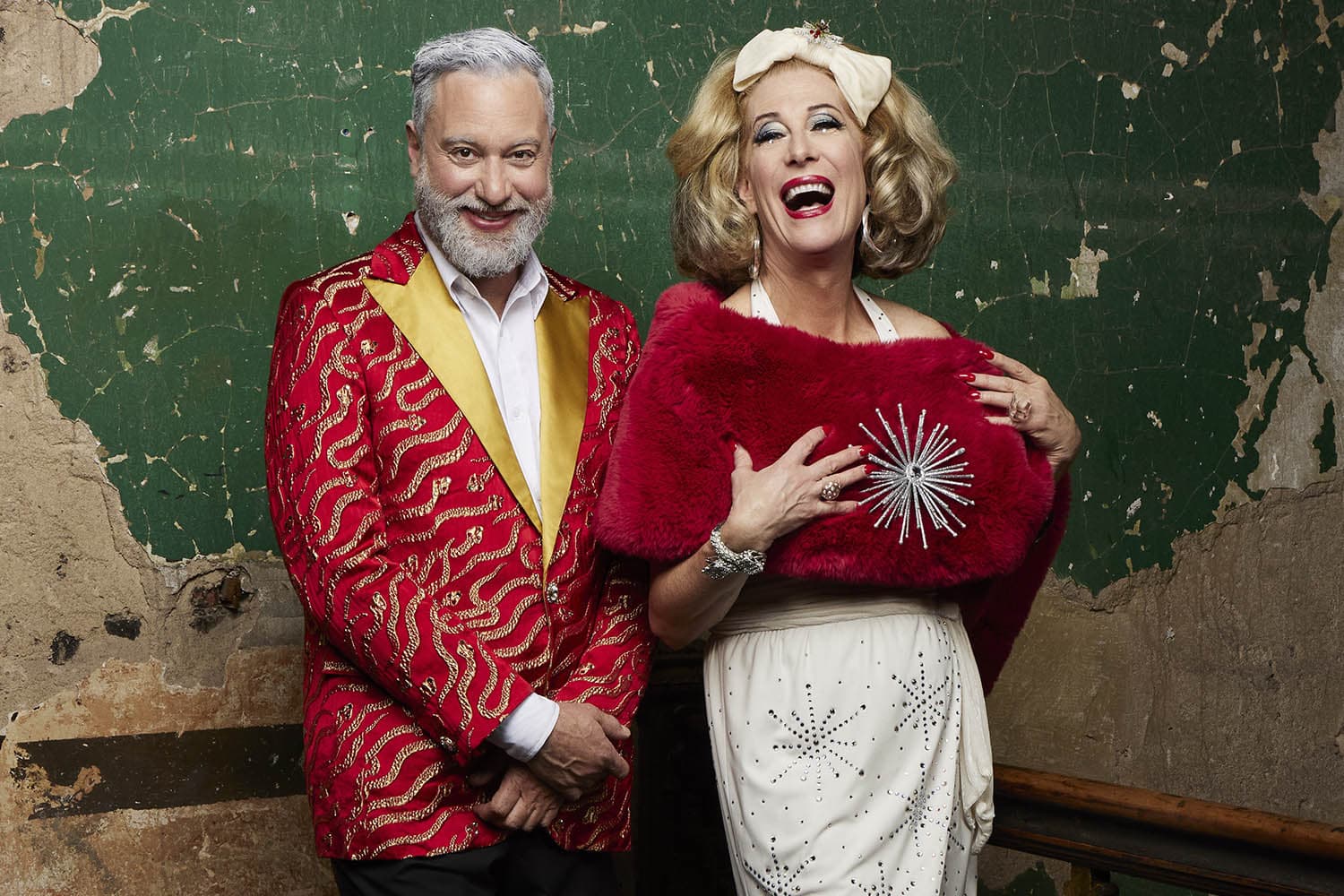When Company opened in 1970, it set the tone for a career of projects through which Stephen Sondheim and his collaborators would stretch the structural boundaries of musical theater storytelling. In the absence of linear plot, the musical melded Sondheim’s pseudo-song cycle and George Furth’s satirical vignettes depicting a series of married couples observed by their abidingly single friend. Furth’s book, with its long stretches of not-that-funny comedy, remains a weight that doesn’t quite balance with Sondheim’s snappier, to-the-point songs, but the show’s unpredictability still feels startling.
Company itself remains far more radical than the shifts that distinguish the Broadway transfer of the successful 2018 West End revival, most notably director Marianne Elliott’s gender-inverted recasting. The male Robert has been reimagined as the female Bobbie (Katrina Lenk), and the heterosexual couple Paul and Amy have been switched out for Paul (Etai Benson) and Jamie (Matt Doyle). The show also trades much of the dialogue across gender to bolster some of the women’s autonomy—or, at least, their multidimensionality.
There are aspects of that grand gender revisioning at the heart of this Company that could be nitpicked as diminishing some emotional heft (for example, Bobbie’s proposal to Jamie is now devoid of tension or possibility). For the most part, though, it works: Company is a study of relationships, not of individuals, of how couples change toward and away from each other. The gender swaps, with some help from Elliott’s occasional edits (completed in consultation with Sondheim), reveal that those depictions have strong bones: It’s the marriage knot in the middle that matters here, less than who’s standing on either side of it.
But this production also reveals how cypher-like Bobbie is, a commitment-phobe with very little precise personality, willing to camouflage to blend in with whatever pair she finds herself third-wheeling with. Bobbie, who keeps forgetting to wish for something when presented with her birthday cake, isn’t a protagonist so much as an agonist in search of a prefix, writhing painfully against her own inertia. Elliott animates that search by sending Bobbie through a labyrinth of trapdoors and miniature keyholes, an Alice in Wonderland-like game of Chutes and Ladders that keeps depositing her in the middle of other people’s lives.
Magnetic and devastatingly droll in The Band’s Visit, Lenk plays the part of the charismatic chameleon compellingly, holding her own coyly, wryly, boisterously with each of the zany couples with which she spends her time. But she doesn’t let her guard down enough in the moments in between for a more transparent, fully sympathetic Bobbie to come through. That’s in large part because she sings most of Sondheim’s soliloquies for Bobbie with an overt crooniness and rather affected vowels that give the sense that the character is still performing for us even when she’s alone; the songs also tend to sit too high in her voice to allow much warmth to enter in. Only in “Being Alive,” the show’s final number, does Lenk offer a shivering, small-scale intimacy, as if she’s learning the words for the first time. It’s too little, too late, though, to buy that this is the Bobbie who we’ve been wanting to get to know all along.
This production’s Alice in Wonderland-like dreamscape is pervasive throughout, even in moments that otherwise suggest realism. The specter of Bobbie’s impending 35th birthday haunts her everywhere, for example, reminding her of her suffocating singledom: Every stoop on the block mystically has the same address, one potential boyfriend has XXXV tattooed on his forearm, and a pair of birthday balloons bearing those two ominous digits, 35, grow larger and larger throughout the show until they dwarf Bobbie altogether.

Elliott’s production couldn’t be slicker—even if Bunny Christie’s jigsaw puzzle-like set has had a tendency to run into some wood-shedding technical difficulties in late previews—and much of her playground of solitude is gorgeous to look at. But it’s also a rather literal expansion of the show’s most obvious metaphor: As Bobbie clambers from apartment to apartment, finding the keys to homes to which she’ll only ever be a visitor, the staging does a lot of lovely, lively work to reinforce what’s already there, rather than to reimagine or reinvent.
I couldn’t stop thinking about Elliott’s extraordinary production of The Curious Incident of the Dog in the Night-Time, which wedded her trademark geometric arrangements of neon-lit set pieces to the story in order to illuminate neurodivergence from the inside out. Nor is Company fully convincing in its 2021 resetting: The Tinder-themed take on “Another Hundred People” aside, “The Ladies Who Lunch” seems very much an analysis of a different time in history.
But if this production of Company is too unnecessarily busy and over-staged, perhaps that’s just the messy consequence of what Bobbie imagines in “Being Alive” when she yearns for “someone to crowd me with love.” It’s certainly love—for the material and the characters and the creators—that motivates this Company, and Elliott leaves plenty of rooms for Sondheim’s score. The music is richly re-orchestrated by David Cullen and conducted by Joel Fram, and the lyrics are rendered reverently but inventively by the cast.
That’s most powerful in the show’s most ambivalent ballad. Sung with exceeding thoughtfulness by Christopher Sieber, the discovery of each phrase a little life raft strong enough to carry him to the next thought, “Sorry-Grateful” registers newly as one of Sondheim’s most brilliant marriages of melody—halting and curious and uncertain—and text.
Then there’s Patti LuPone, known for her dubious diction but here making every one of Joanne’s words crystal-clear while blending in comfortably with the rest of the ensemble cast. It’s her performance of “The Little Things You Do Together,” a paean to domestic disharmony, that lands with particular devastating force. And Doyle, as the terrified Jamie, moments away from marriage, delivers a hysterical—in both senses of the word—performance of the accelerating panicked patter song “Getting Married Today,” gleefully accompanied by Nikki Renee Daniels, popping out of kitchen appliances to declare impending doom.
Company, more so than any other Sondheim score, gnaws at the writer’s own internal battle between withdrawn cynicism and a whole-throttle embrace and acceptance of life in all its raw untidiness. And this production is never better than when it dives headfirst into that joy: In the wake of Sondheim’s passing, this is one company committed to making sure that he’s remembered for not just his drollness at a distance, but also for being very much alive.
Company is now running at the Bernard B. Jacobs Theatre.
Since 2001, we've brought you uncompromising, candid takes on the world of film, music, television, video games, theater, and more. Independently owned and operated publications like Slant have been hit hard in recent years, but we’re committed to keeping our content free and accessible—meaning no paywalls or fees.
If you like what we do, please consider subscribing to our Patreon or making a donation.





